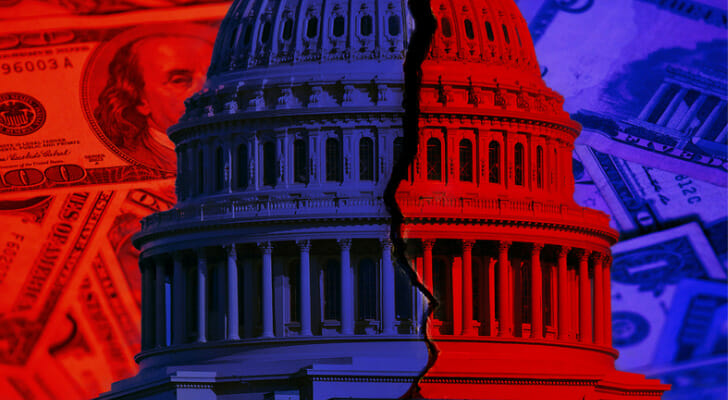 The financial sector is the largest political donor in American politics, but the views held within aren’t always what you may think.
The financial sector is the largest political donor in American politics, but the views held within aren’t always what you may think.
Open Secrets, which tracks money in politics, defines the financial sector as insurance companies, real estate firms, commercial/depository banks, and investment/securities firms. It is, OpenSecrets reports, “far and away the largest source of campaign contributions to federal candidates and parties.”
This has been true for decades. In almost every election of the 21st Century finance has dominated campaign and political contributions. The only exception came in 2020, when general professionals as a whole narrowly edged out finance.
The upshot? When you invest, pay insurance premiums or even make a deposit, your money might go to helping someone get elected. So there’s a few things you should probably know.
For more information about handling your money responsibly, consider working with a financial advisor.
Financial Institutions Give Enormous Sums
In 2010, the Supreme Court issued a decision called Citizens United. This ruling held that spending money on an election constitutions political speech, which the government cannot limit or regulate under the First Amendment. Rules regarding direct campaign contributions, that is money given directly to a candidate or their campaign, remained on the books. However it’s unconstitutional to limit money that donors independently spend advertising issues, parties or movements.
This decision increased U.S. political spending by orders of magnitude. For example, in 2006 donors spent less than $5 million on so-called “dark money” expenses, campaign spending where the source is kept secret. By 2012, the election immediately following Citizens United, that number jumped to more than $300 million.
The financial sector is no exception.
Between the midterm elections in 2010 and 2018 financial sector campaign spending more than doubled, surging from less than $400 million to more almost $900 million. In this year’s election, financial firms spent more than $1.3 billion on federal elections, with half a billion given directly to political candidates and parties. This dwarfs the next largest individual industry, technology and communications, which donates a combined $289 million.
Financial Institutions Don’t Always Give to Whom You’d Expect
Historically, the financial sector has strongly supported conservative Republican candidates. As OpenSecrets writes, financial firms “contributed generous sums to both parties until 2010 when donations began to heavily bias Republicans, which likely reflects the finance industry’s interest in overturning the financial regulations from the Dodd-Frank Act, implemented to protect consumers from predatory lending practices and risky financial decisions from the industry.”
Contributions in the 1990s support this analysis, with financial firms trending heavily Republican during the deregulation push of 1996 and 1998.
However that trend has begun to break. In each election starting in 2016, financial firms have begun shifting their support away from Republican candidates and conservative causes.
In 2022’s election, the trend has reversed. According to OpenSecrets, financial spending now narrowly favors Democrats and liberal causes. While giving roughly 48.4% of its spending to right wing politics, roughly 51.3% of all financial sector spending now goes to left wing politics. Given how strongly Republican policies tend to favor the interests of the financial sector, this is a result that many voters may not expect.
Financial Institutions Are Committed

In a departure from many businesses, financial firms tend to commit politically.
Historically, many businesses have tended to spread their campaign contributions among Republicans and Democrats. While businesses have a specific interest in lobbying for certain policies, their biggest interest has historically been in building relationships with sitting politicians regardless of who wins the election.
However when it comes to the financial industry, most firms choose sides. Of the top 20 donors alone, only five split their donations among Democratic- and Republican-leaning causes. The rest give most or all of their money to a specific party. The blockchain-based company FTX.US, for example, donated roughly 72% of its money to left-leaning causes. At the same time the hedge fund Citadel, LLC spent virtually all of its money on right-wing elections.
The takeaway is that, in 2022, financial firms appear to support specific outcomes. Rather than trying to buy general influence among politicians, firms seem to be trying to boost specific policies and politics that they would like to succeed.
Financial Institutions’ Donations Reflect Personalities
Pick out the pattern:
- Soros Fund Management: Dem – 100% Rep – 0%
- Citadel, LLC: Dem – 0.9% Rep – 99.1%
- Thiel Capital: Dem – 0% Rep – 100%
- Bloomberg LP: Dem – 86.2% Rep – 13.8%
- Elliott Management: Dem – 11.4% Rep – 88.1%
- Ryan Specialty Group: Dem – 15.5% Rep – 84.5%
These are not only some of the most single-party donors among financial firms, but they’re also personality-driven organizations.
When it comes to financial firms, donations often reflect the personalities of the investors driving these companies. George Soros, for example, is a well known advocate for liberal causes. As a result, his investment firm entirely supports Democrats and related issues. Peter Thiel is equally committed to conservative politics. His firm exclusively supports Republicans and related issues.
Within finance, investment firms dominate the list of big money donors. These firms are themselves often dominated by outsized personalities, a reality which ranges from their business models to their politics.
You Rarely Need to Worry About It
As a consumer, you usually don’t need to worry too much about how your money is being spent.
Among the finance industry’s top donors, very few are consumer-focused. Firms like Soros Fund Management, Citadel, LLC and the Blackstone Group rarely handle business from private individuals. Even major donors like the Susquehanna International Group are business-to-business organizations.
A handful of firms are consumer-focused or operate in related industries, like the National Association of Realtors and the Charles Schwab Group. They’re the significant minority of donors however, both by number of firms and volume of donations.
Instead, the reality of this industry is that the companies giving the big money tend to do business with big money. As an individual consumer, your insurance company and bank almost certainly give some money to politicians, but they’re probably not the biggest fish.
The Bottom Line
In this election, financial firms dominate political giving and spending. The next biggest donors aren’t even close.
Tips for Money Management
- When it comes to campaign finance, the rules and reality can be extremely complicated. Here’s how it works.
- SmartAsset’s matching tool can help you find a financial advisor in your area to make sure you pick the banks and investors that align with your values.
Photo credit: ©iStock.com/Douglas Rissing, ©iStock.com/Steven White